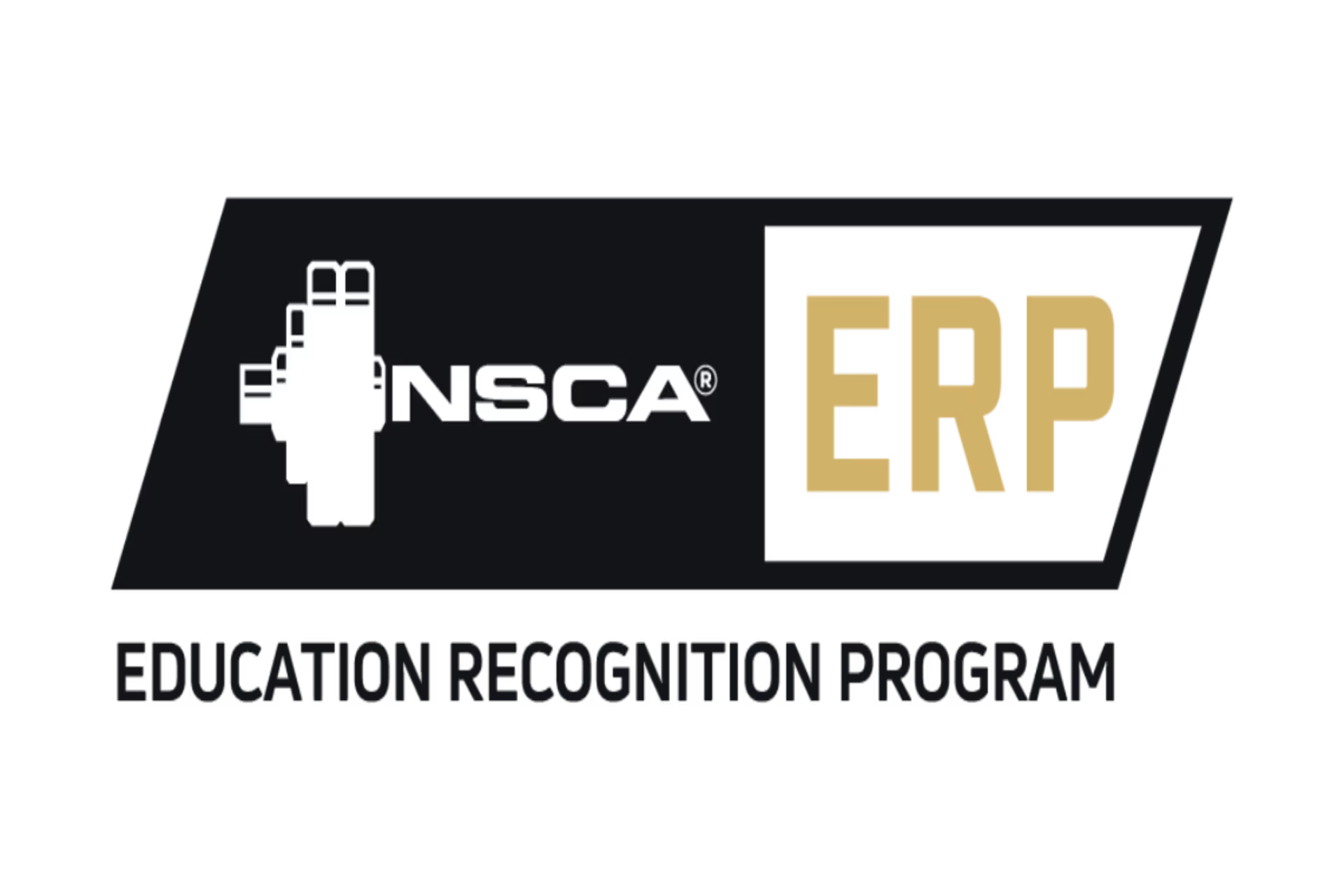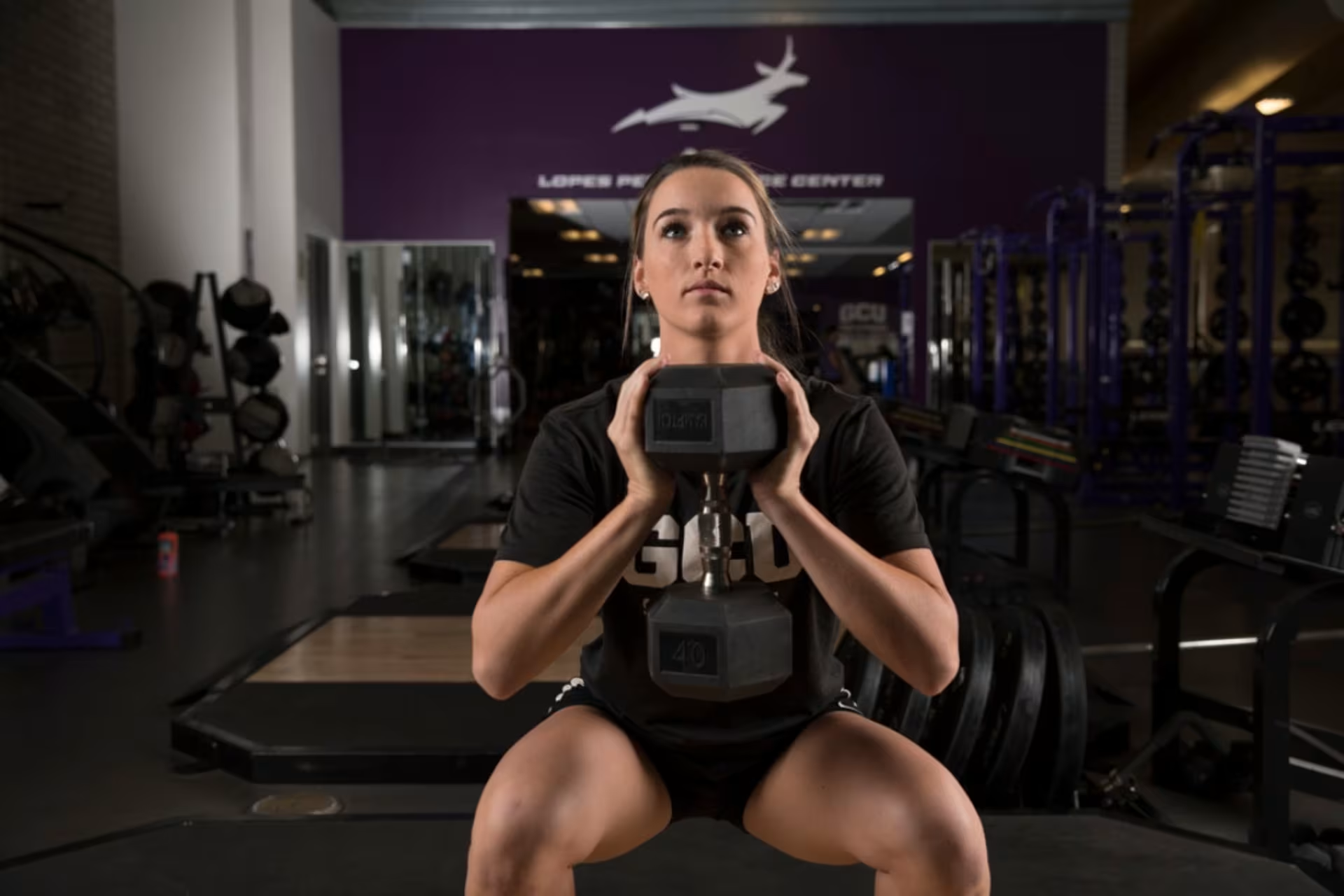


This BS in Exercise Science with a focus on sports performance is proudly approved by the Education Recognition Program (ERP) through the National Strength and Conditioning Association (NSCA). This recognition affirms that the program meets high standards in preparing you for careers in strength and conditioning, sports science and fitness. This designation also recognizes and distinguishes programs with approved and standardized strength and conditioning curricula. It highlights GCU’s ability to prepare students for the NSCA Certified Strength and Conditioning Specialist® (CSCS®) certification. Requirements for the CSCS are changing in 2030, and GCU is developing a new program to meet the new CSCS standards.
In addition, GCU holds accreditation from the Higher Learning Commission. GCU is pleased to offer institutionally accredited programs to continue in our long-standing tradition of prioritizing the quality of our curriculum and instruction.

The sports performance courses include a capstone course, which is intended to give you an opportunity to demonstrate the competencies taught in this program. There is a focus on preparation for exercise science careers. This educational program is structured to provide you with the tools to prepare yourself for the rigors of exercise science professions, including a comprehensive foundation and preparation in exercise physiology, assessment techniques and the latest industry trends.
Enjoy an active learning environment while you earn your bachelor’s in exercise science degree on GCU’s supportive, friendly campus. You will have opportunities to examine the many factors that contribute to overall health and wellness, as well as sports performance.
As you work through the exercise curriculum, you will be taught competencies in content areas that include:
Principles of sound nutrition and how food selection contributes to overall wellness
Foundational basics of sports performance
Effective exercise programming in resistance training and cardiovascular fitness
The design of health education and physical fitness programs through the lens of special populations
The analysis of human movement, its influences and proper biomechanics
While the U.S. Bureau of Labor Statistics (BLS) may not offer specific details on careers in exercise science, related occupations such as exercise physiologists are among the fields relevant to this degree, focusing on assessing, improving and maintaining individuals' physical fitness and overall health.(See disclaimer 2)
With this bachelor’s in exercise science sports performance emphasis, you may be positioned to pursue work as an exercise physiologist. Professionals in this role develop physical activity programs to help people improve components of their fitness, such as cardiovascular function, muscular strength or flexibility.(See disclaimer 2)
It’s important to note that some careers within exercise science may require additional training, practicum experience or certification beyond an undergraduate degree.
Average median annual wage for exercise physiologists as of May 2024(See disclaimer 3)
This BS in Exercise Science at Grand Canyon University is designed to help prepare you for direct entry into the field of sports performance and strength and conditioning at various levels of athletics, including high school, college, club, professional sports and private practice, among others.
You can expect coursework that may prepare you to pursue graduate-level studies and qualify you to seek various nationally recognized professional certifications in the field.

This bachelor’s degree includes flexible electives that can enable you to align your academic path with your career plans. This program delves into the scientific principles and processes pertaining to exercise science and athletic performance, which may position you to better support athletes as they strive to reach their full potential. In addition, the program offers comprehensive coursework in areas such as corrective exercises, resistance training and cardiovascular exercise.

Sports and exercise science is a versatile field that may be applicable to a range of industries. With a foundation of competencies in this field, you might pursue a variety of potential career opportunities. Some may even choose to pursue a master’s or doctoral level education to further specialize in an area of sports performance or a related field. This may increase your chances of earning advanced certifications in the strength and conditioning industry, which may allow you to position yourself to potentially enhance career qualifications and opportunities.
At GCU, you will have opportunities to gain hands-on experience with a variety of populations. Through our research program and outreach activities, including undergraduate research and student-run clinics, exercise science students may have the opportunity to work with firefighters, law enforcement, the military and a variety of athletic teams on and off campus, including professional sports teams
GCU has an exercise science teaching laboratory that may allow you the opportunity to experience what it is like to act as an athletic performance professional, conducting tests similar to those performed by professional sports coaches. You will be taught how to use high-tech laboratory equipment throughout the exercise science and sports performance courses.
Estimated job growth for exercise physiologists from 2024 to 2034(See disclaimer 1)
Your choices of a degree and career path are significant decisions for your future. Take some time to review the following frequently asked questions and answers, which may help you become more familiar with the exercise science field.
Is exercise science a difficult degree?
What qualifications do you need to be a sports scientist?
What certifications can you get with a bachelor’s in exercise science?
Is a degree in exercise science worth it?
How much do exercise science majors make?
Campus: $8,250 per semester [More Info]
Up to 90 credits, only 84 can be lower division
Credits: Fill out the Lopes Eval to find out what will transfer
Admission Requirements (Bachelor's)
OR 2.5+ Unweighted GPA and
Admission requirements may differ based on degree level, program and modality, or transfer status. Some programs of study may require a higher GPA and/or other qualifying criteria for admission. Please review full admission and program requirements in the University Policy Handbook.
*Math and reading only on a 1600 point scale (test date after 3/1/2016). SAT score of 1380 required for 2400 point scale (test date before 3/1/2016).

Are you eager to combine your passion for sports and fitness with purpose for your future career? Fill out the form on this page to learn more about GCU’s Bachelor of Science in Exercise Science with an Emphasis in Sports Performance degree.